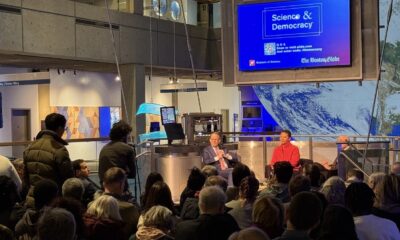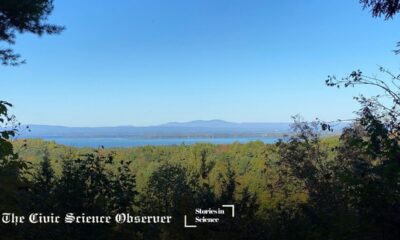Stories in Science Special Series
Unsung: William Claytor
The third African-American to earn a Ph.D. in mathematics struggled his entire career against the barriers of institutional racism.

Sibrina Nichelle Collins
[su_boxbox title=”About”]Sibrina Collins is an organometallic chemist and former writer and editor for the American Association for the Advancement of Science in Washington, D.C. In July, 2016, she became the first executive director of the Marburger STEM Center at Lawrence Technological University in Southfield, Michigan. This article was originally published on Undark on November 2, 2016 by Sibrina Nichelle Collins. Read the original article.[/su_boxbox]
I recently attended a workshop at Harvard University titled “From Missing Persons to Critical Biography: Reframing Minority Identity in the History of Science, Technology, and Medicine.” Funded by the National Science Foundation, the event was organized by Evelynn M. Hammonds of Harvard and Amy Slaton of Drexel University — both scholars specializing in the history and sociology of science. As a chemist devoted to narratives of the past, I was honored to be in the presence of these and other academics working in fields ranging from science history and biology to medicine and economics.
More importantly, the gathering was itself a signal of our collective commitment to shining a bright light on the too-often forgotten contributions of women and minorities to the fields of science, technology, engineering, and mathematics — which is the very mission of this column.
“The absence of these historical biographies,” Hammonds told those assembled for the workshop last month, “implies that people of color have no interest in STEM.”
A little digging, of course, suggests that’s not the case, and it is in this context — and enhanced spirit — that I herewith share the story of William Waldron Schieffelin Claytor, only the third African-American to earn a Ph.D. in mathematics. Largely unknown to the broader American public, Claytor is yet another “Unsung” STEM hero — and he is one who typifies both the importance of peer mentoring in advancing the careers of people of color, and the tragic legacy of institutional racism that no amount of mentoring could help to overcome.
Claytor was born in Norfolk, Virginia, in January of 1908 — the oldest child of Simsie Thorne, a graduate of the nearby Hampton Normal and Agricultural Institute, and William O. Claytor, an educator at the Southern Norfolk Colored Graded School in Norfolk. When Claytor was five years old, his father moved the family to Washington, D.C., where he worked briefly for the U.S. Bureau of Engraving and Printing, after which he established his own dental practice in the nation’s capital.

Dr. Sibrina Collins
Claytor himself was educated in the public schools of the city, eventually matriculating to college studies at Howard University — today among the nation’s Historically Black Colleges and Universities — where he earned his bachelor’s degree in mathematics in 1929. He then enrolled in the newly established mathematics graduate program at Howard, earning a master’s degree in 1930. Claytor’s thesis advisor was Dudley Weldon Woodward — who, as it happens, had become the second African-American to earn a doctoral degree in mathematics, this time from the University of Pennsylvania, just two years earlier. (Elbert Frank Cox, also a faculty member at Howard University, was the first African American to earn a Ph.D. in mathematics in 1925, from Cornell University.)
Woodward had earned his Ph.D. under the direction of UPenn professor John R. Kline, and in his mentoring of Claytor, he encouraged him to apply to the doctoral program there so that he could work with Kline. Claytor enrolled in 1930, and went on to earn numerous awards and grants, including the Harrison Scholarship in Mathematics and a Harrison Fellowship in Mathematics — both prestigious awards for outstanding students. By 1933, Claytor — an expert in topology, which focuses on the geometric properties of space — had earned his Ph.D., and he published his dissertation a year later.
For all of his acumen, Claytor emerged from his studies with limited job opportunities available to him. During his time, HBCUs were the primary employers of African-American faculty, and he eventually accepted a teaching position at West Virginia State College, where he taught mathematics for three years — including to Katherine Coleman Johnson, who would later work for NASA as a human “computer” and complete orbital space calculations for astronaut John Glenn.
In 1936, Claytor accepted a postdoctoral appointment at the University of Michigan working under the direction of renowned mathematician Professor R.L. Wilder. His position was supported with fellowships and grants through the 1938-39 year and when a permanent faculty position became available in the department of mathematics, Wilder and his colleagues lobbied the administration to hire Claytor. But the barriers of institutional racism were too great to surmount, and Claytor was not offered the position.
Wilder continued to try to help Claytor find an academic position to no avail.
Instead, Claytor enlisted in U.S. Army during the World War II effort, and spent much of his time teaching courses focused on the physics of anti-aircraft artillery. In 1947, at the invitation of David Blackwell, chair of the mathematics department at Howard University, Claytor returned to his alma mater as a faculty member. One year later, Claytor married the psychologist Mae Belle Pullins, who shared his love of mathematics. The couple had one daughter, and Claytor remained at Howard University until he retired in 1965.
Over the course of his career at Howard, Claytor did give well-received presentations at the national meetings of the American Mathematical Society, but abject discrimination dictated that he was not allowed to stay in the hotels where the meetings were being held, and Claytor eventually stopped attending the conferences all together.
“Claytor had been trained to do mathematical research,” wrote Karen Hunger Parshall, a professor of history and mathematics at the University of Virginia, in a recently published article titled “Mathematics and the Politics of Race: The Case of William Claytor,” “but de jure segregation in the South and de facto segregation elsewhere, left the research universities largely closed to him, and made it hard for him even to participate in the activities of his professional societies.”
Claytor died in 1967 at the age of 59. Thirteen years later, the National Association of Mathematics recognized his contributions to the field by establishing a lecture series in his name. This is the least that could have been done. For while it is impossible to know precisely what Claytor could have accomplished if he had not experienced such obstinate racism in his field, it is no great speculation to assume that the collective body of human knowledge was robbed of something because of it.
Sibrina Collins is an organometallic chemist and former writer and editor for the American Association for the Advancement of Science in Washington, D.C. In July, 2016, she became the first executive director of the Marburger STEM Center at Lawrence Technological University in Southfield, Michigan.
This article was originally published on Undark. Read the original article.
Featured Image Credit: The Dolph Briscoe Center for American History
Metrics
Sessions
Total number of Sessions. A session is the period time a user is actively engaged with the page.
Visitors
Users that have had at least one session within the selected date range. Includes both new and returning users.
Page views
Pageviews is the total number of time the article was viewed. Repeated views are counted.
The CS Media Lab is a Boston-anchored civic science news collective with local, national and global coverage on TV, digital print, and radio through CivicSciTV, CivicSciTimes, and CivicSciRadio. Programs include Questions of the Day, Changemakers, QuickTake, Consider This Next, Stories in Science, Sai Resident Collective and more.

-
 Audio Studio1 month ago
Audio Studio1 month ago“Reading it opened up a whole new world.” Kim Steele on building her company ‘Documentaries Don’t Work’
-
Civic Science Observer1 week ago
‘Science policy’ Google searches spiked in 2025. What does that mean?
-
Civic Science Observer1 month ago
Our developing civic science photojournalism experiment: Photos from 2025
-
Civic Science Observer1 month ago
Together again: Day 1 of the 2025 ASTC conference in black and white
Contact
Menu
Designed with WordPress

























